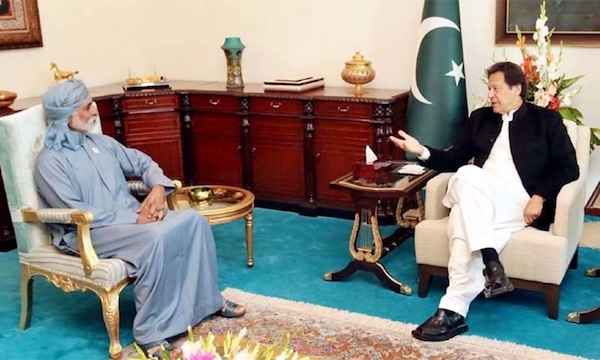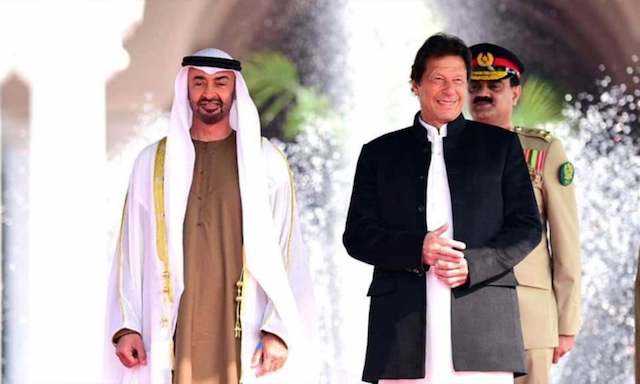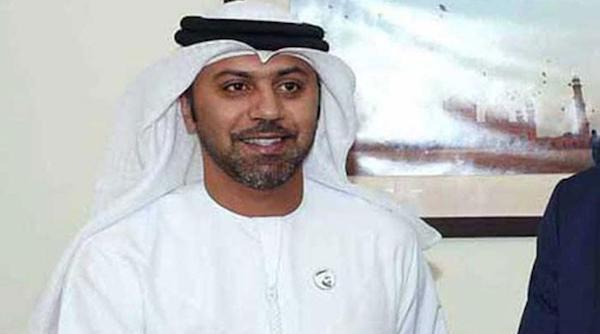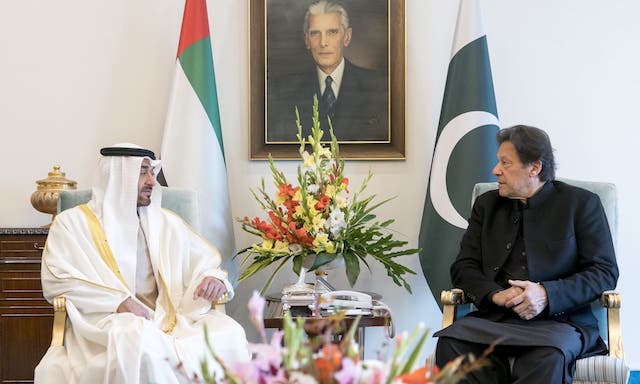The United Arab Emirates (UAE) and Pakistan have been taking pragmatic steps to revive Stailed ties since 2018. Abu Dhabi Crown Prince Sheikh Mohammad Bin Zayed Al Nahyan visited Pakistan for a day long visit “on Jan 2, 2020 to further strengthen the bonds of friendship between the two brotherly countries. Both value their friendship and fraternal ties based on brotherhood, mutual respect and deep-rooted cultural affinities and identity of interests and have continued to move from strength to strength since inception. UAE and Pakistan are bound by common threads to their religious and cultural values and their strong historical relations are based on a solid foundation laid down by late Sheikh Zayed bin Sultan Al Nahyan.
During the visit, the crown prince held a meeting with Prime Minister Imran Khan “to discuss the ways to enhance bilateral relations between the two countries”. In addition, views on matters of mutual interest and the regional and global situation were also be discussed. The UAE crown prince had last visited Pakistan on January 6 in 2019, just weeks after his country offered $3 billion to support Pakistan’s battered economy.

The UAE crown prince’s visit that was part of growing exchanges between Pakistan and Arab countries took place less than a week after Emirati Minister for Tolerance Sheikh Nahyan bin Mubarak Al-Nahyan met the premier and President Arif Alvi to discuss possibilities of expanding bilateral ties. Prior to this important visit Chief of Army Staff Gen Qamar Bajwa had travelled to Abu Dhabi on December 14.
Last year, Sheikh Mohammed bin Zayed Al Nahyan had visited Pakistan for one-on-one meetings with PM Imran, followed by delegation-level talks. This most recent visit marked the first official foreign visit by Sheikh Mohammed, also Deputy Supreme Commander of the Armed Forces. Nearly a year after last visiting the country on January 6, 2019, Sheikh Mohammed arrived in Islamabad and met PM Imran Khan to discuss ways to further bilateral relations. They discussed the situation in the Middle East, Arabian Gulf, Indian subcontinent and the Islamic world, and exchanged views on regional and international issues of common concern.
Sheikh Mohamed also directed the Khalifa Fund for Enterprise Development to allocate $200 million (Dh734.5m) to support small and medium-sized enterprises in Pakistan. The initiative aims to boost entrepreneurship, assisting the Pakistani government’s efforts to create a stable and balanced national economy.
Sheikh Mohamed also spoke of the bonds of friendship that unite the two nations, pointing to Pakistan’s role in maintaining regional peace and security in the Arabian Gulf. He said Pakistan was an essential pillar within the Organisation of Islamic Cooperation, an organisation founded in 1969 and comprising 57 member states, most of which are Muslim-majority countries. The organisation seeks to be the collective voice of the Muslim world and protect the interests of Muslims through peace and co-operation.

PM Imran Khan thanked Sheikh Mohamed for the UAE’s support towards Pakistan’s economy and development sector and for his keenness to enhance bilateral relations and spoke of the pivotal role he played in supporting development and peace, regionally and internationally. “Pakistan and the UAE are very close and our leadership has frequent interactions with each other. It helped to promote trade and investment relations in important areas like defence, education and health.”
UAE’s economic partnership with Pakistan would strengthen “in the near future. Both countries have strong and strategic alliance. More than 1.6 million Pakistani community (the biggest Pakistani community in the world) lives and works in the UAE. Their remittances from working in the UAE amount to $433.42 million (Dh1.59 billion) annually. Moreover, Pakistan’s private sector has invested in Dubai’s real estate sector. According to Pakistan official figure UAE investments in Pakistan stand at more than $3.9 billion. Pakistan exports $869 million worth of goods to the UAE, and imports goods worth $7.5 billion in return. Pakistan’s exports to UAE include mainly rice, textiles and leather, which do not signify the true potential of opportunities between the two countries. The petroleum sector, infrastructure development and the China–Pakistan Economic Corridor were top potential areas for UAE investment in Pakistan.
Pakistan has the potential and the UAE the capacity to invest in these sectors, and in Gwadar, a port city on the south-western coast of Balochistan and Pakistan’s largest infrastructural project since its independence. The UAE Government has a number of projects in Pakistan, including in health and infrastructure under the UAE Pakistan Assistance Program. Tourism is another sector that could provide a “win-win situation” for both countries. There is huge potential for the economic partnership in the near future and in the distant future will definitely be strengthened between the two countries.”
It is hoped that Sheikh Mohamed’s visit would “contribute to further enhancement of multi-faced collaboration between Pakistan and the UAE”. Pakistan’s Ministry of Foreign Affairs said both countries clearly viewed their fraternal ties as being of great importance.
“The visit illustrates the strength and substance of the Pakistan-UAE special relationship, based on commonalities of faith, cultural affinities, and a shared resolve to take mutual co-operation to a new level,” the ministry said.
“The UAE is Pakistan’s largest trading partner in the Middle East and a major source of investments. The UAE is also among Pakistan’s prime development partners in education, health and energy sectors.” On Pakistani part, a Pakistani naval ship is due to make a good will visit to Dubai.
Relations between the UAE and Pakistan have gone from strength to strength over the past few years. In December, Sheikh Mohamed met Gen Qamar Bajwa, Pakistan’s Army Chief of Staff. In high-level talks at Al Bahr Palace in Abu Dhabi, the two discussed efforts to protect security and develop cooperation.
Last year, Hamad Al Zaabi, the UAE ambassador to Pakistan, announced the UAE’s continuing efforts to help Pakistan eradicate polio by 2022.

Through the Emirates Polio Campaign, Mr Al Zaabi said the UAE has played a “major role in eradicating polio” by actively contributing to the financing and support of critical vaccination campaigns in Pakistan.
The leadership has adopted an economic model capable of being at the top helm both regionally and globally, he added. According to latest report titled “Global Competitiveness Report, 2019”, released by the World Economic Forum:-
”The UAE lead in Macroeconomic stability is yet another proof of the vibrancy, strength and resilience of the national economy to ride over challenges facing the world economy today, and to keep abreast of the latest economic development trends,” he affirmed. The report, he noted, has recognised the government ability to respond promptly to global transformations and to adopt the most advanced technologies.
The UAE has been ranked among the world’s top five countries in 19 indicators and among the first 20 countries globally in 57 indicators more than 50 percent of indicators monitored by the report this year.
In sub-indicators, the UAE came first globally in macroeconomic stability, second in ICT adoption and fourth in Product market. The UAE also advanced in eight out of 12 key pillars i.e. Infrastructure; ICT adoption; Education; Skills; Product market; Labour market; Business dynamism and Innovation capability.
As for sub-indicators, the UAE advanced in 17 out of 22 in 2019. The UAE came in the top ten globally: Public-sector performance (4th), Domestic competition (6th), Security (7th), Trade openness (7th), Entrepreneurial culture (8th), Infrastructure and transport(8th) and Future orientation of government (9th).
It is undeniable that the UAE’s story of progress since the unity of its Emirates has been an impressive story of success. Over a period of more than 40 years, the UAE has achieved many important milestones in the medical, educational, technological and social arenas. It also witnessed impressive economic and urban revolutions, crowning the UAE as one of the leading touristic destinations and investment hub, both regionally and internationally. Now, it seems that the bilateral relations between the United Arab Emirates and Pakistan have acquired new dimensions at all political, economic and social levels emerging into trust-worthy strategic partnership. UAE has been one of the biggest investors in Pakistan for the last so many years which has encouraged investment and helped greater trade and commerce activities.




